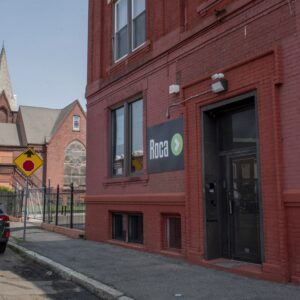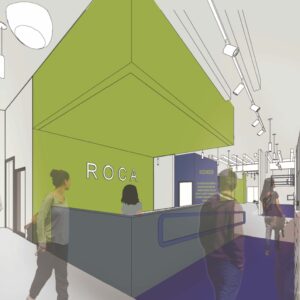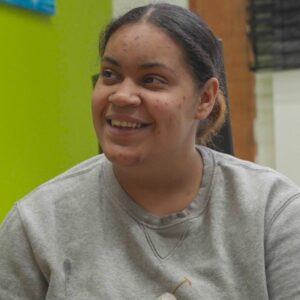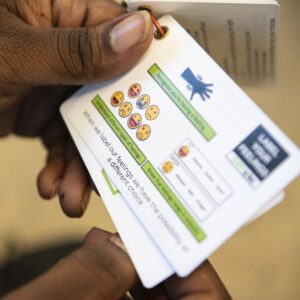Issue 17 | Summer/Fall 2024
In the typical narrative, urban violence is driven by young men who turn to gangs and criminal activity to navigate a world where violence is a means of survival. So why are nearly a quarter of Roca participants young women?
Young women caught at the intersection of poverty, racism, and violence face similar pressures to young men—day-to-day survival amid constant trauma. Over the past several years we’ve seen an increase in number of young women caught up in the criminal justice system and violent crime—as both victims and perpetrators.
But in many ways, young women’s involvement with violence is more complicated. Their lives are often shaped by trafficking, sexual and domestic violence, and involvement with multiple complex public systems. On top of that, most of Roca’s young women are parents themselves, trying their best to shelter their children from the chaos.
Before Roca transitioned from providing home-visiting services to serving only the highest-risk young mothers in 2013, no other organization in the country was focused on this unique group of women. But in the last 11 years we’ve been able to stop hundreds of young women from slipping through the cracks and expand the Young Mothers’ Program—now Young Women’s Program—to 5 sites in Massachusetts and 1 in Hartford, CT.
Throughout this issue of Roca Ink, we take a closer look at the young women at the center of urban violence: highlighting young women’s stories, the unique challenges they face, and the strong outcomes that Roca is known for.

In the News
The Rise of the New Roca
Full-scale renovation project will transform its national headquarters in Chelsea
Read in The Chelsea Record
Chelsea Program Focuses on Protecting Young Mothers from Violence
Listen on WBUR

Hot off the Press
Roca Helps Young Women Improve Behavioral Health
Midway through their 3-year evaluation of Roca’s Young Mothers Program, Tufts Interdisciplinary Evaluation Research (TIER) has released their preliminary results: they dive deep into the risk factors that make Roca’s young women unique, the paths they take as they move through our program, and their outcomes.
After 12 months with Roca, they found young women had significant reductions in emotion dysregulation, depressive symptoms, PTSD, relationship violence and unhealthy relationships, and alcohol use.

Roca Holyoke Open House
Wednesday, October 2 | 9:00 – 10:00 AM
Roca Holyoke has moved! Join us as we invite the public to our new space in Holyoke, MA for the first time.
Roca’s new space in Holyoke checks all the boxes: it’s a more modern facility with plenty of outdoor space, and close to public transit, making it easily accessible for our young people and their families.
Join us for a tour of the new site. Meet our front-line Youth Workers and some of the young men we serve. Learn how we provide trauma-informed support to young men in Holyoke and surrounding communities—those who are facing the highest risk and experiencing the most urgent need.

Young Women Grow at Auerfarm
Roca Hartford’s Newest Partnership
On a late winter morning at Auerfarm, cold sunlight illuminates golden fields, and the breeze carries the distant sounds of mooing cows and bleating goats. Suddenly the calm is broken as a Moya, a young woman from Hartford, roars her weedwhacker to life and begins belting out an impromptu Linkin Park cover. Against the pastoral landscape, Moya works away alongside other young women, absorbed in the music blasting through her headphones and oblivious to the chill and to the manure piles she steps over without seeing.
Rewind to a year ago and the scenery looks very different, as does Moya herself.
Before she started work at Auerfarm as a participant in Roca’s Transitional Employment Program (TEP), Moya, 20, was lost in violence and poverty on Hartford’s meanest streets. Originally from Jamaica, Moya immigrated with her mother, who allowed her to be trafficked from a young age to feed a drug habit. She became pregnant at 15, but her son was taken away because she couldn’t give him a safe place to live.
At Roca, transitional employment is just one part of our wholistic intervention model based in cognitive behavioral therapy (CBT), specially designed for young people with too much trauma to succeed in other employment programs. TEP helps to accelerate behavior change by setting firm expectations for behavior on the job, creating a group dynamic that can bring out the best and worst in participants, and building in chances to mess up, get fired—sometimes a dozen times—and try again.
Ever since Roca brought our Young Mothers program to Hartford in October 2021, we’ve been searching for the right community partner to employ our young women, and we’ve finally found it in Auerfarm, a 100+ year-old, 120-acre farm in Bloomfield, CT, that has operated as a 4-H education center since 1976. Our partnership with Auerfarm offers traumatized young women a serene and supportive environment where they can disconnect from the violence of the streets and heal past traumas.
At Auerfarm, Moya learned how to operate heavy machinery and even helped lay the foundation for a new barn wall. She became comfortable using power tools, repairing a fence, and pruning trees. Beyond that, she learned to be responsible to the job and to her teammates, to manage and save her new earnings, and, underpinning all of this, to use the seven life-saving Rewire CBT skills. Her time at Roca helped her build a new life with hope for a brighter future—she became a US citizen, achieved stable housing in her first apartment, and is applying to college.

Roca Chelsea Taking Shape
Summer Construction Update
Just a few short months ago Roca completely gutted our Chelsea, MA site to create an updated, modernized headquarters. Our partners at Consigli Construction are working incredibly hard and the renovations are ahead of schedule—we hope to reopen our doors by the end of the year. As of now, the walls are back up and our home base is starting to take shape. Watch as Joe, VP of Operations, takes us inside for a sneak peek:
The finish line is in sight for the construction, but we still need community support to reach our fundraising goal for the renovations—donate to the campaign for Roca Chelsea to help put us over the top!
We can’t wait to and invite our community back to Roca Chelsea soon to show you what you’ve helped us build—stay tuned.

Participant Spotlight
Meet Jalexis Velez
Throughout her childhood, Jalexis was in and out of foster care, often finding herself homeless with no one she could count on. We first met her 4 years ago when she was pregnant with her first child, Maya, and silently struggling with her mental health after a lifetime of trauma. Not long after Maya was born, Maya’s father began to abuse Jalexis. She tried to escape after she became pregnant with their second child, Jay’ceon, but instead the abuse only escalated. Isolated from everyone, Jalexis began missing her children’s doctor’s appointments, raising concerns from DCF. Things came to a head when her boyfriend tried to kill her in front of their children, and nearly killed their son in the process. He was arrested and sentenced, but Jalexis lost custody of the children.
That experience was her turning point, and since then Jalexis has put in the work. She has maintained a job and stable housing, and is finishing her high school diploma. She has learned to advocate for herself and her children, using her CBT skills to navigate difficult situations with patience and understanding—especially with DCF. Along the way she has worked on her mental health and learned self-love. Jalexis wants nothing more than to bring her children home, and she continues to fight for them every day. Getting to know and support Jalexis and her children these past 4 years has been a true privilege.
Jalexis is a 2024 recipient of Roca’s Vichey Phoung Peace Award, which recognizes Roca participants who, through their hard work and determination, have achieved substantial positive change in their lives, exemplifying the transformation which Roca seeks to bring about in all of the young people it serves.

Q&A
The mailbag highlights some of the most common questions we hear from donors and community members. Have a question for us? Email it to info@rocainc.com.
Q: What happens if a young person is involved in a crime while participating in Roca? How many young people that Roca works with get arrested or go to jail?
A: Roca never gives up on a young person or their possibility for change, which is why we don’t kick young people out of Roca. The transformation we’ve seen in young people’s lives happened because we built trust and were there unconditionally—even through setbacks like blowing up at a staff member, blowing off work, or going to jail.
If a young person is sentenced for six months or less, a Roca youth worker continues to work with them: visiting them in jail and continuing to practice Rewire CBT skills. If their sentence is longer, their youth worker still stays in touch, but we restart the clock on their four years with us once they get out, so they get the additional support they need.
They need us to show them, maybe for the first time in their lives, that there’s someone who won’t give up on them. Someone who believes that, sooner or later, they’ll get it right. And most of them do: for every 10 young people who were committing violence before entering the program, eight or nine stay out of trouble and have no new convictions.

Learn a Rewire CBT Skill
Rewire CBT is a relatable and simple version of cognitive-behavioral theory that helps young people heal from trauma by rewiring their brains. The 7 Rewire CBT skills help young people understand the relationship between what they think and say in their heads, what they feel in their bodies, and what they do in response.
Rewire CBT Skill #4: Act on Your Values
Growing up constantly in harm’s way, Roca’s young people react on a hair trigger when they feel disrespected, pissed off, or scared. When fight or flight kicks in, they lash out without thinking through the consequences. Getting high or punching someone—or doing something even more dangerous—might feel good in the moment, but it will also get them into trouble.
They need help to slow down and think through the consequences before they act. The Act on Your Values skill helps young people figure out what really matters to them—whether it’s staying out of jail, being a good parent, or getting their GED. Instead of acting impulsively, it helps them slow down and act intentionally, taking control over their lives and their futures.
“My values are my kids, those are the most important things. So if I lose my job, I can’t feed them. If I wake up and I don’t do what I’m supposed to do, then that’s backtracking for them, I can’t show them how great you can make it in life.”
—Bianca

We’re Hiring
Roca is looking for excellent candidates who are committed to helping young people at the center of urban violence transform their lives. We are hiring for several positions in Baltimore MD, Hartford CT, and across Massachusetts, including:
- Playroom Coordinator to engage the young children of participants in our Young Mothers Program and support their healthy development.
- Court and Criminal Justice Specialist to support and advocate for young people involved in the juvenile and criminal justice systems, working closely with probation and court personnel.
- After Shooting Protocol Manager to help us reach every nonfatal shooting victim in Baltimore who falls into our target population within 48 hours of the shooting.
- Basic Needs Specialists to connect young people to essential resources and meet their basic needs like food, shelter, and healthcare.
And many more! Visit our jobs page for all openings.
If you’re excited by Roca’s mission and think one of these jobs would fit you well, we invite you to apply or forward the job listings to a friend.


